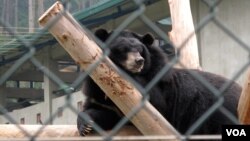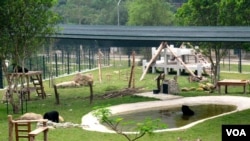Animal rights activists in Vietnam are hailing the expansion of a bear sanctuary for creatures rescued from the country’s bear bile trade. Efforts to crack down on bear bile farming continue, more than 20 years after the product was officially banned.
The opening of two new enclosures at a bear sanctuary in Tam Dao national park this month comes after years of uncertainty, said Tuan Bendixsen, the Vietnam director for Animals Asia.
“It’s been a struggle for the last three years and we never thought we’d get this far. The opening today not only shows that we have support from around the world but the Vietnamese government as well,” said Bendixsen.
In 2012, Vietnam's Ministry of Defense attempted to shut down the project, run by the Hong Kong-based Animals Asia group, for reasons of “national security.” Activists said the move was the result of lobbying by the director of a national park after a failed bid to build a hotel on the land. Eventually the prime minister stepped in and allowed the charity to continue operating.
Bendixsen said the sanctuary is a key part of efforts to end Vietnam’s bear bile farms. On the farms, the animals are kept in tiny cages and subjected to surgical procedures to drain bile from their gall bladder for use in traditional medicines.
“We can now go full steam ahead and hopefully they will use this occasion to accelerate the closing of bear farms,” said Bendixsen.
At the opening, Nguyen Quoc Hieu, Head of the Forest Protection and Management Office under the Ministry of Agriculture and Rural Development, said the project received a lot of attention from the government.
He said now about 80 percent of the project had been completed, and 111 bears have been rescued. The enclosures have enough space for 80 more animals.
The Vietnamese government banned bear bile farming in 1992, but people are allowed to keep bears as pets or as a tourist attraction. In 2005, the Vietnamese government launched efforts to phase out the practice. Officials microchipped 4,000 bears to ensure that no more were taken from the wild, but poor government supervision allowed the farms to continue.
A world away from the horror of the farms, the bears at the sanctuary spread themselves out on wooden platforms, clamber on tire swings or splash around in pools surrounded by forest and a burbling stream on the other side of the fence. They are completely transformed from the damaged animals first brought to the sanctuary.
“There’s no comparison, when they come in their coats are dull, many are missing fur. Their teeth are a disgrace because many of them are engaged in repetitive bar biting. So often they can be blind or have horrible eye problems. They can have scars running the whole length of their bodies,” said Jill Robinson, founder of Animals Asia.
But despite this victory, a lot of work still needs to be done, said Bendixsen.
“The biggest obstacles are that the Vietnamese government needs to make more commitment toward ending bear bile farming. Not only within terms of enforcement but more resources. This is a problem not to be solved by one NGO. I think we need to work with the government and the government needs to supply us with all the support they can give to end this industry,” said Bendixsen.
Last month local NGO Education for Nature Vietnam announced that two bear farms in Ha Long Bay, which illegally extracted bile to sell to tourists, mostly from South Korea, had closed down following pressure from local authorities.
Nguyen Phuong Dung is director of the animal welfare group.
She said the bears had been returned to their original owners, who had kept them before sending them to the bile farms.
There are indications that the bear bile industry is in decline, Dung said, but the government needs to do more to monitor farms to make sure no new bears are being taken there. There also needs to be stronger punishments for those who violate the laws on bile extraction.





